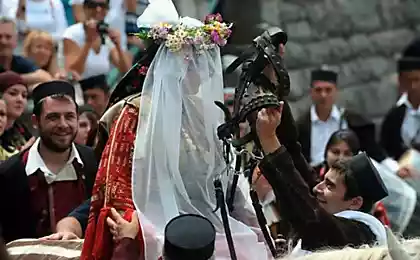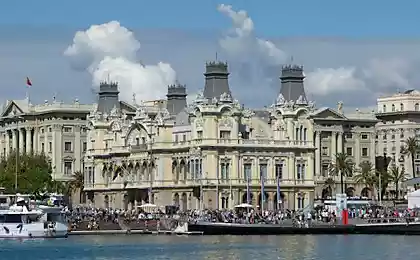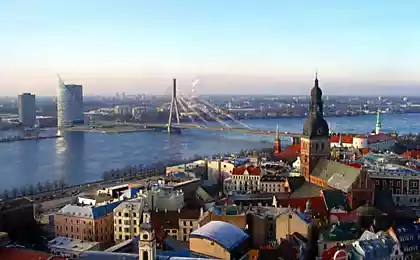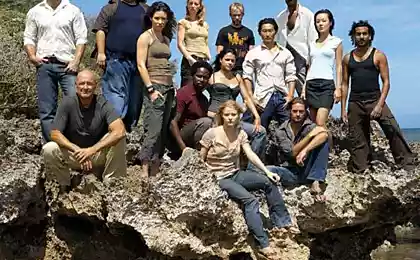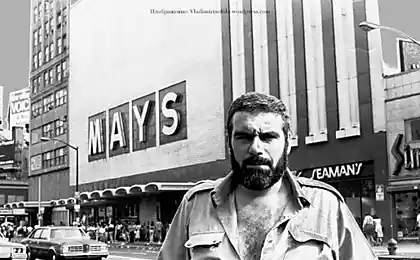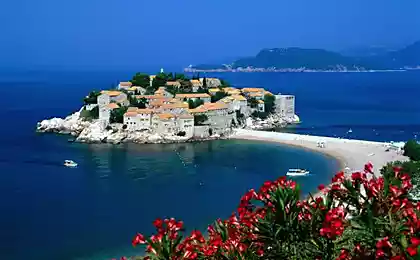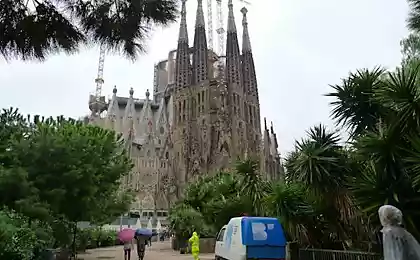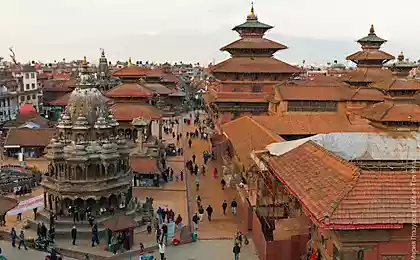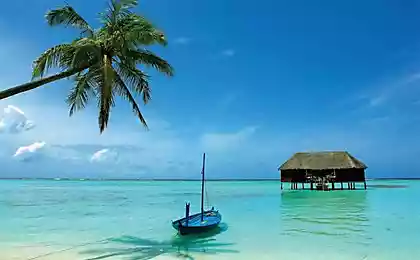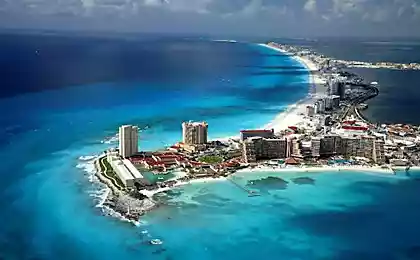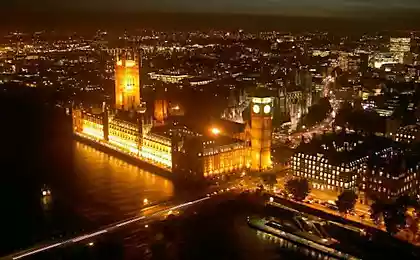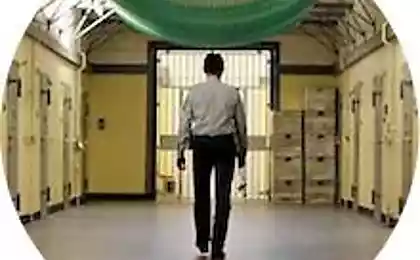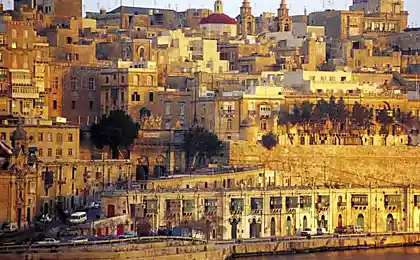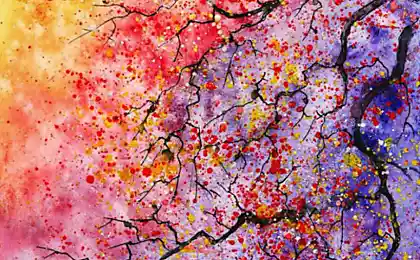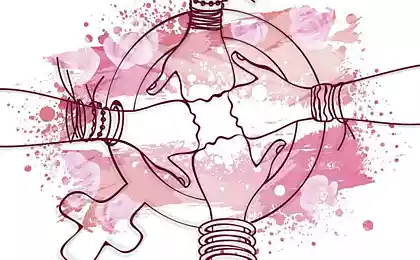1210
108 facts about Macedonia eyes Ukrainian
Writes our reader Irina Chernenko offer my article about the Republic of Macedonia. As a child I lived there, I was in school, and then worked for many years in the Macedonian company. Almost every year we go to rest in the family Ohrid.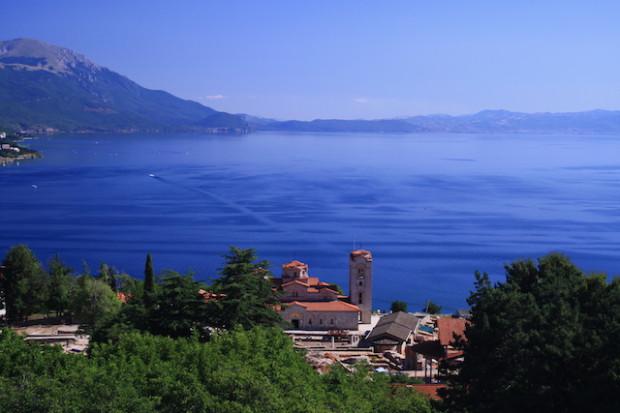
1. Macedonia - a country in the south of the Balkan Peninsula with an area of 26 thousand km2, population - two million people, of whom about 500,000 live in the capital - Skopje.
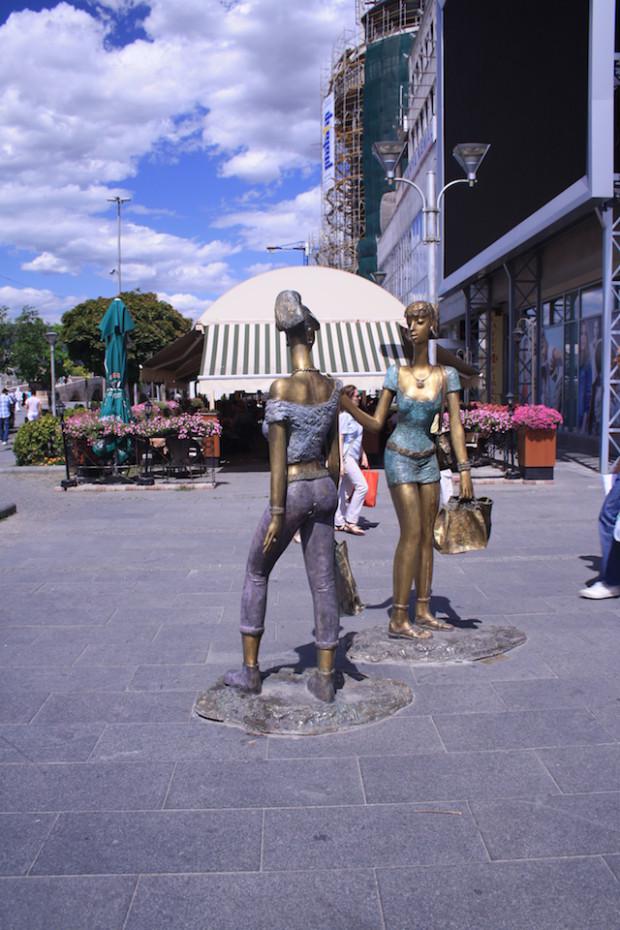
2. Modern Macedonians - Orthodox, their ancestors - Slavs who came, according to local history textbook for grade 6, because of the Carpathians in the VI-VII centuries BC. e., and assimilate the local population.
< 3. There are several Macedonius: Pirinski - at the moment it is part of Bulgaria, Aegean - Greece, Gradeshka - from Albania. The northern part of Macedonia went to Serbia and was named the South Serbia. The modern state Republic of Macedonia is located between all these countries and covers an area that has historically called Vardar Macedonia - the name of the river Vardar.
4. For more than five centuries, until 1912, Macedonia was part of the Ottoman Empire. Therefore, some of the traditions, food and even the music remind Turkish.
5. The National Macedonians tool called mandolin and balalaika cool recalls.
6. Macedonians always wanted to become independent, so often heroically rebelled against the Turks.
7. In memory of the heroic uprising built a huge monument - "Macedonium" in Krusevo, where in 1903 the Ilinden uprising broke out, which resulted in kruševo republic was established. The Republic lasted not long - ten days later the Turks broke up the revolt, killing all revolutionaries. The revolutionaries became heroes, their names sound the national anthem, and August 2 (Elijah on the church calendar, "Ilinden") is celebrated every year in a big way.
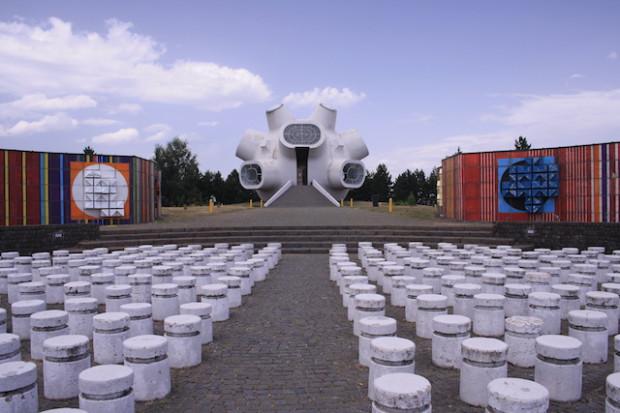
8. After the fall of the Ottoman Empire Macedonia did not have statehood, and deciding the fate of its neighbors, the Turks won in the I Balkan War and then fell out among themselves.
9. The Greeks do not like the modern state the Republic of Macedonia and in every way put pressure on him to make the name change. The fact that under the agreement the Allies from 1912, all the territory taken from Macedonians passed "good" neighbors a period of 100 years, and if at the expiration of this period, there will be a state called Macedonia, they will have to return to Macedonia it land.
10. A number of states have recognized the young country imposed on Greece under the name Former Yugoslav Republic of Macedonia (FYROM). Under the same name, she came to the United Nations.
11. Macedonia fulfilled almost all conditions for accession to the EU, but the entry of Greece blocks its veto. Of course, before the change of the name of Macedonia.
12. its policy Greece explains that she has a region called Macedonia, and for this reason the neighboring state has no right to be called so. In 2011, the Hague International Court of Justice decided that Greece has no right to do that.
13. The current state of Macedonia emerged after the collapse of Yugoslavia, September 8, 1991..
14. The Macedonians, who "comes from the SFRY" very warm feelings towards Josif Broz Tito, the older generation can meet his portraits on the wall in the living room. The libraries have books about his childhood Tito, they are written in the style of books of childhood Lenin, but somehow sincere.
15. Alexander the Great was the ancient Macedonians, not Greek. The Greeks even denied his participation in the Olympic Games, citing the fact that participate are entitled to only the Greeks.
16. The Greeks managed to force the Macedonians to change his coat, appropriating the right to the "Sun of Alexander." But the Patriots still decorate their room and even make a tattoo with the arms and various phrases whose meaning is "to die, but do not change your name».
17. Macedonians speak Macedonian language. Yes, there is such a language. Everyone understands and freely communicate with the Serbs, Croats, Montenegrins, Bulgarians, are two different languages, but they are similar. The younger generation in cities speak English. The older generation had once taught Russian in school, but as a rule, no one remembers.
18. Despite the modest size of the country, there are many different dialects of the Macedonian, which can differ greatly from the literary.
19. Macedonians use the Cyrillic alphabet, but the Internet rewritten using transliteration. They are so used to not change the language on the keyboard and typing on transliteration, which use it for business correspondence. It transliteration rather than its own version of the Latin alphabet. Printed publications are still in Cyrillic.
20. Cyril and Methodius created the Cyrillic alphabet did not, they created the Glagolitic and Cyrillic alphabet created their disciples Clement of Ohrid and Naum of Ohrid and named it in honor of teachers. Ohrid - a city in Macedonia.
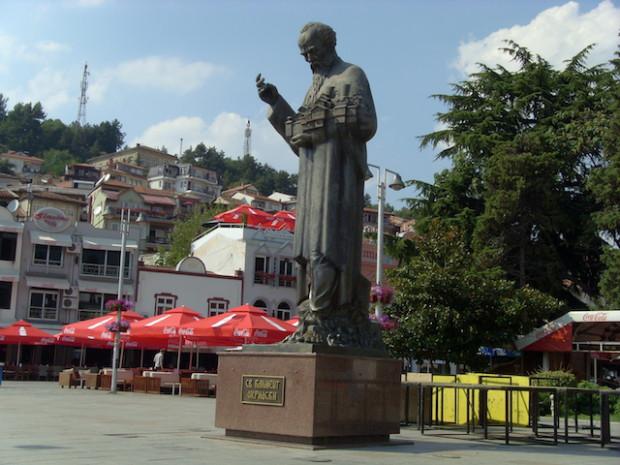
21. Mother Cyril and Methodius - Greek woman and her father - a Macedonian. Consequently, they are not Bulgarians, as it is written in some textbooks.
22. In Macedonia, there are three areas of popular music: folk pop music, popular music and a children's pop music.
23. The Macedonian folk music is very patriotic, sounding reminiscent of wedding music western Ukrainians and Moldovans.
24. Children's bandstand is composed of several festivals, which serve children of all ages, it's shown on local television. Thus, their children, children's idols, favorite songs on children's issues. The city has a children's disco from 11 am do15-16 pm, everything as adults - light-music, DJs, a dance floor.
25. The National Dance - Oro. Dance, hand in hand, like a dance, but foot traffic complex and different for the different rhythm of the music.
26
27. City Struga every year becomes a venue for poetry readings, which flock to the poets from around the world.
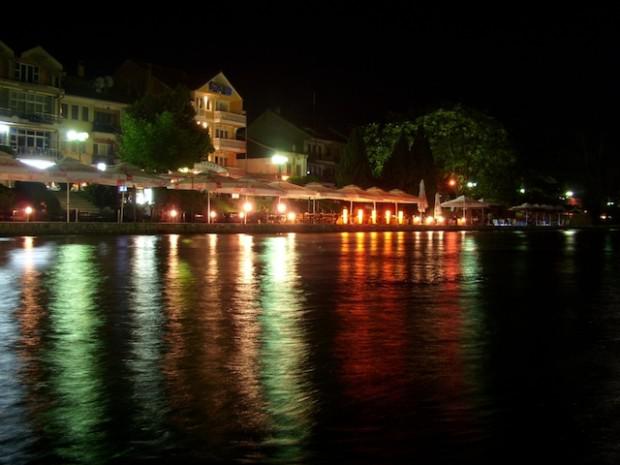
28. The city of Bitola are the ruins of Heraclea - Palace of Phillip II, father of Alexander the Great.
29
30. In the center of Skopje recently installed a huge monument to Alexander the Great, but so as not to anger the Greeks called it "Warrior on a horse».
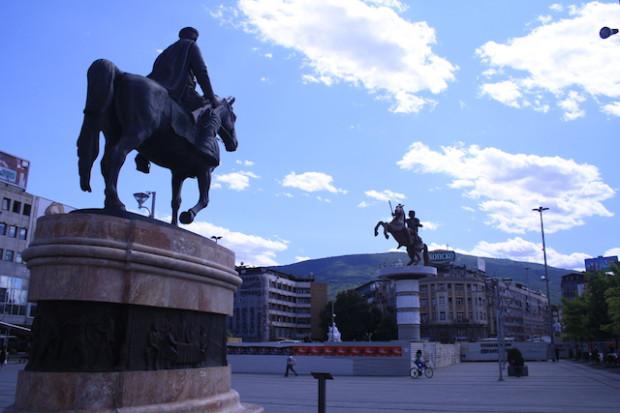
31. Skopje is the church of St. Spas with a unique iconostasis, dating from the VI-th century.
32. Skopje - the city where winter is colder than in the rest of Macedonia, and hotter in summer. Local love to tell that they are twenty below, but this is not true.
33. In Macedonia, a warm and dry climate, 300 sunny days a year. In winter the temperature below -5, typically from 0 to 5, in summer - + 25 + 35, sometimes up to 40. If a storm happens, be sure to hit the lightning and often kill someone.
34. The majority of Macedonian children have no idea what the sled and how to sculpt a snowman.
35. in the mountains of Macedonia colder and there is snow. Ski: Mavrovo, Krusevo, Popova Hat. Mavrovo National Park is open to tourists in the summer.
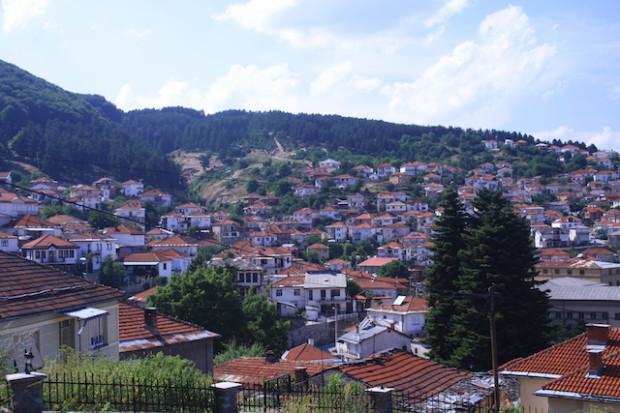
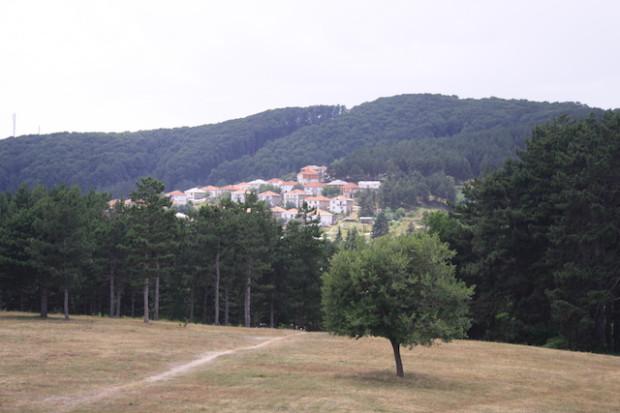
36. Macedonia is an ancient observatory - Kokino. It looks just a pile of stones.
37. Prilep City is known for its summer beer festival, which act Balkan pop stars. Local residents why it is called Maimon (monkeys).
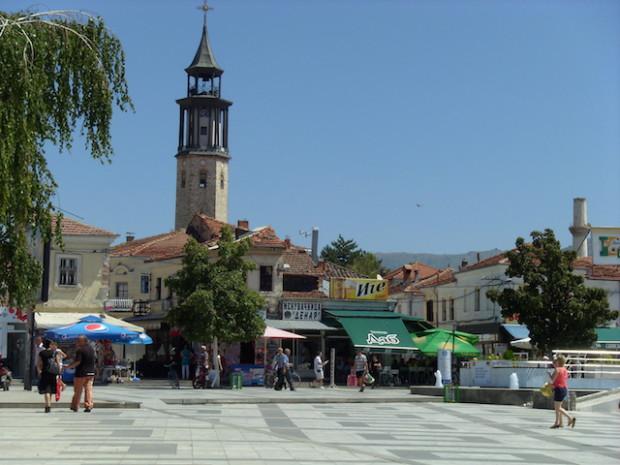
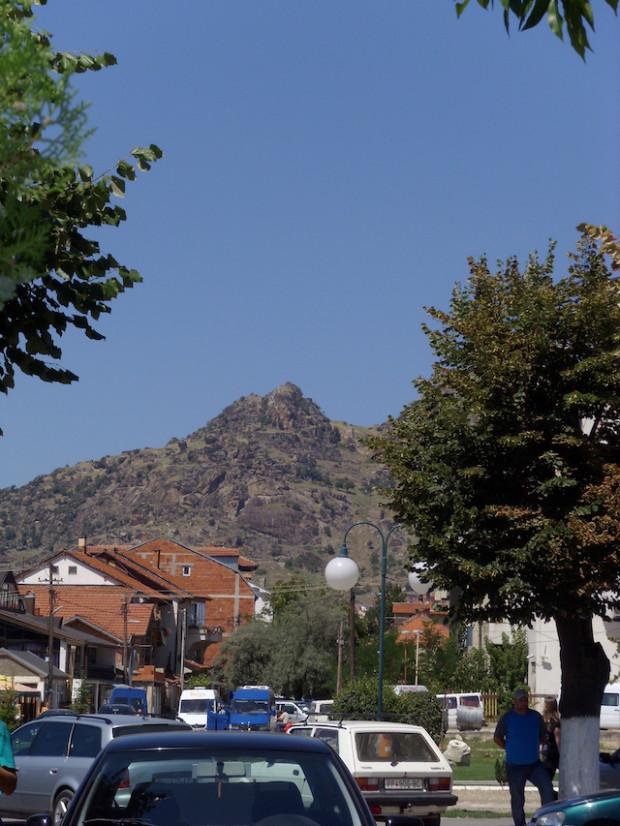
38. We Macedonians are many beautiful and interesting folk tales and legends.
39. Macedonia has no outlet to the sea, but has a lot of lakes, of which the most famous - Lake Ohrid.
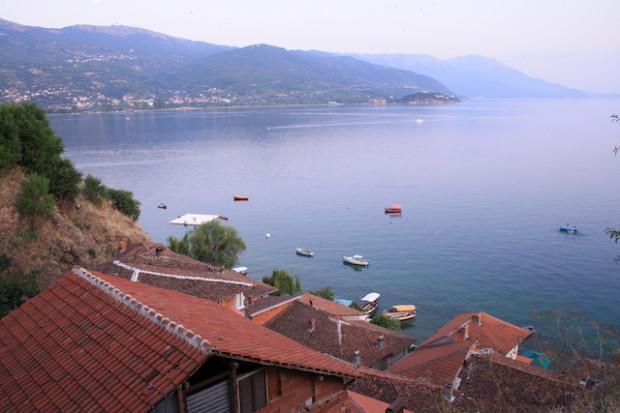
40. Lake Ohrid - the oldest and deepest in the Balkans, located at an altitude of 750 meter above sea level, the depth of about 300 meters, it is about five million years.
41. The water in Lake Ohrid is very clean. It does not waste water is drained, even the river, which flows into the lake before it clean of debris.
42. The waters of the river Crni Drin, which flows into Lake Ohrid, do not mix with the waters of the lake, and the height can be seen as it flows through the turquoise water black ribbon and flows from the opposite side.
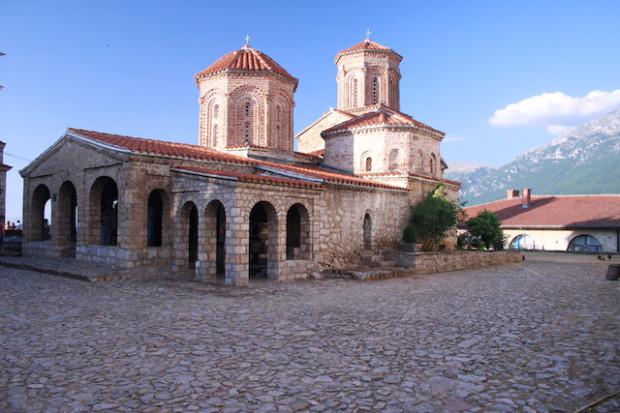
43. The city of Ohrid, which is a lake, marks the first Slavic University, a large number of churches, a beautiful monastery, which overlooks the water, ancient amphitheater.
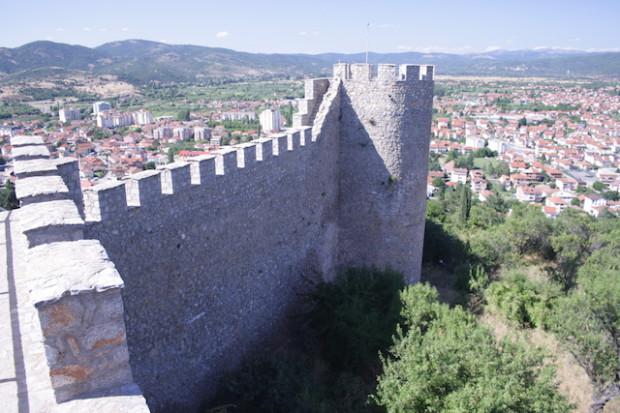
44. The town of Ohrid and its lake are included in the UNESCO World Heritage List in 1980.
45. in Ohrid are very few Russian tourists. Many Germans, Belgians, Swiss, Danes, tourists from the Baltic states and Scandinavia.
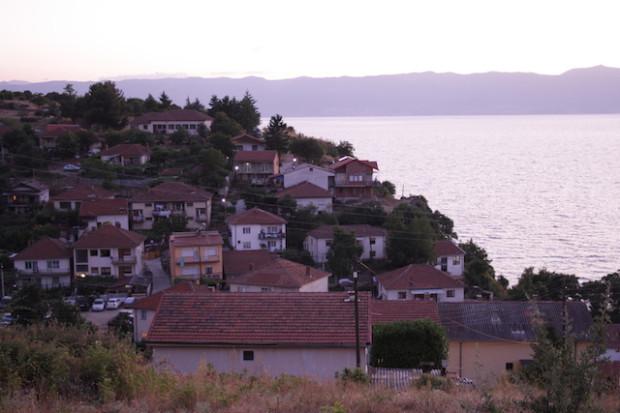
46. Every wealthy Macedonians have a house or apartment in Ohrid, where they come for the weekend, but they prefer to spend their vacation in Montenegro or Greece, because the sea is warmer than the lake.
47. Ohrid reminds Adriatic coast: beautiful promenade, many restaurants and hotels. The beaches are located outside the city. Water has arranged chairs for guests, right behind them - restaurants and cafes, every 50 meters are equipped with modern restrooms, which were never paid. Sun loungers also free, you just have a drink at a cafe. There are wild beaches, but they are not popular.
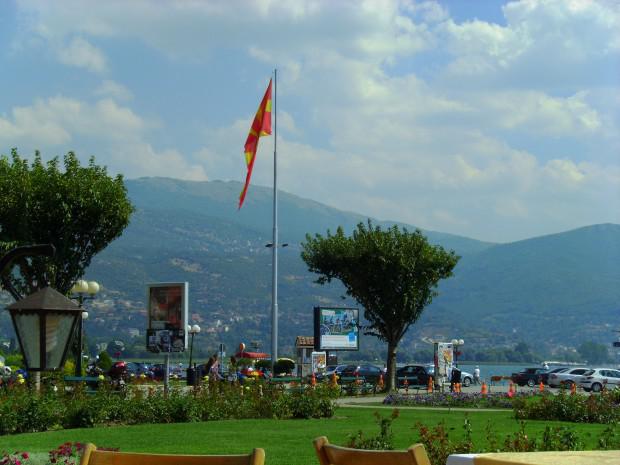
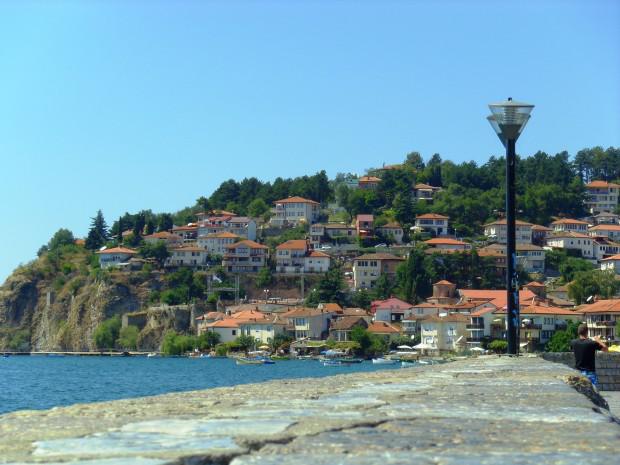
48. The locals are very friendly. They love tourists. Many offer accommodation to tourists. The cost of housing - from $ 3-5 at the home of grannies to $ 7-8 per person per day for 2-3 bed room in a private boarding house with all amenities in the room and fresh renovation. Other tourist ride on a boat. On the waterfront selling souvenirs, soda, baked corn, donuts into the glaze, books, antiques. Macedonians from other cities are called ohridyan greedy and ready to drive home a relative, only to hand it over to the tourist area.
49. To Russian are treated with respect. Find all Russian citizens of CIS countries. Russian mafia scare naughty little children.
50. The demographic situation in the country is such that about 60% of men and women - 40%. The girls marry early, men often do not marry up to 30-35 years, some do not ever get married.
51. It is not surprising if the Macedonian whom you see the third time in his life, stuffed your friends and ask to bring him a bride. Popular marriage tours to neighboring countries.
52. Crime in non-Albanian areas in Macedonia is close to zero. The car in the city can not even close.
53. Macedonians - very patriotic citizens. Each house has a flag, souvenirs or clothes with national symbols, they adore their cuisine, music, football team, and believe that all Macedonian - the best.
54. 20:00 - the evening news, the whole of Macedonia adheres to the TV screen. Of particular joy among the population caused the news from other countries, with the mention of Macedonia, even if someone just found a map of the state.
55. Macedonians - the politically active citizens. And they love to gossip. These things are closely linked. It's not just know the name of Ministers and the President and what policies they hold, but also someone who is a relative, who lives where, which goes to the left, and where the rest.
56. Football watching all: men, women, children. Sick, worried. As well as watching basketball, volleyball, handball, tennis, and also suffer from no less interest. Generally accepted among Macedonians to keep abreast of sports news, to discuss them.
57. When the Macedonian football or basketball team wins, in the center of each city is going to a huge crowd, and all rejoice and celebrate until the morning.
58. Macedonians respected their police, it is a prestigious profession. The Academy honors to take only the best physical preparation. However, there is a saying: 'jokes about the police do not happen - all the truth ».
59. Macedonian men rarely fight. They swear, sometimes threaten each other, but not to the fighting comes.
60. Macedonian men - bouncers. They like to brag to neighbors and visitors from other cities, especially in front of foreigners. A foreigner, they are proud to show and his own house and the neighbor's house, and the city, and tell the story of the country, and all of this with pride.
61. Macedonians, especially those living in small towns and villages, a very open and sincere, foreigners love to pester with stupid questions like "have a cow the same?" or "How do you pray?" and if you like it, be sure to say that you are very beautiful and they are in the lives of beautiful people have not seen.
62. The first question at the meeting: "Kako si?" (how are you?) or "B arenas?" (are you ok?) I must respond to the "super" or "arenas / Arna". The second question - how old are you. Third - where you work.
63. With the operation in Macedonia is not easy. You can get an acquaintance, but in a good position - on party affiliation. In this regard, there is a state policy to support entrepreneurs who create jobs.
64. All the relatives are very happy when a boy is born, the birth of girls, they are calmer. Women in childbirth ask who gave birth? A child or a girl?
65. For little boys are very kind. It is believed that they have to share a meal, they saw nothing to deny, "because he's a boy." However, today's parents are more progressive and love all children equally.
66. Makedonka very proud that they have equal rights with men. But this is true only for a small amount of capital and urban families. In fact, everything is much patriarchal. Women are much less likely to receive higher education, rarely occupy high positions.
67. The women usually stay at home, to bear and raise children. Required for 2-3 hours sitting in a neighbor visiting each other, drinking coffee, wondering on the coffee grounds, lots of smoke and discuss other neighbors.
68. The working day starts at 7.30-8.00, ending in 1530-1600. All organizations working late, working in 2-3 shifts. After dinner the men work at home and often go sit in Kafanov (cafe). The women there are less common. Young people walking in the city center, which is called the bazaar, most people go out for a walk for 21-22: 00 pm, when it is not hot.
69. Macedonians live in houses made of ceramic blocks of small width, inside and outside the whitewashed with lime, no wallpaper and carpets on the walls, with plenty of sofas, ottomans, chairs and other furniture minimum. Houses there are several families live together, parents and brothers and sons. Daughter home or land is left as a last resort, only if there is no son.
70. The Macedonian homes have no central heating, often around the house has only one portable electric heater, which is in the children's bedroom, the others just have a good hiding. In modern homes found "warm floor».
71. The men are very nice. Women tend to be slim, and it's their only plus feature.
72. Some conventional heterosexual men Macedonian pluck eyebrows, and it is not considered to be something strange. Some grow a fingernail on his pinky.
73. Makedonka dress simple dress out of favor, often go in jeans. Fashionistas rare. Boutiques of famous brands in Macedonia there is little, fashionable dress can be, if there are abroad, as it turns out from residents of the capital, so they are considered the most beautiful. Skopje fashionistas even erected a monument in the city center.
74. Macedonians indifferent to reading books. Of course, there are exceptions, but not many. From popular crafts crochet. Usually women knit thin white thread napkins and tablecloths.
75. Cinemas little, going to the cinema tradition there. On the TV show foreign films with subtitles, voice without translation.
76. In small towns there are practically no high-rise buildings. Skopje (the capital) common apartment buildings.
77. In Skopje many women are employed. The capital's residents educated, earn more and more often abroad.
via factroom.ru

1. Macedonia - a country in the south of the Balkan Peninsula with an area of 26 thousand km2, population - two million people, of whom about 500,000 live in the capital - Skopje.

2. Modern Macedonians - Orthodox, their ancestors - Slavs who came, according to local history textbook for grade 6, because of the Carpathians in the VI-VII centuries BC. e., and assimilate the local population.
< 3. There are several Macedonius: Pirinski - at the moment it is part of Bulgaria, Aegean - Greece, Gradeshka - from Albania. The northern part of Macedonia went to Serbia and was named the South Serbia. The modern state Republic of Macedonia is located between all these countries and covers an area that has historically called Vardar Macedonia - the name of the river Vardar.
4. For more than five centuries, until 1912, Macedonia was part of the Ottoman Empire. Therefore, some of the traditions, food and even the music remind Turkish.
5. The National Macedonians tool called mandolin and balalaika cool recalls.
6. Macedonians always wanted to become independent, so often heroically rebelled against the Turks.
7. In memory of the heroic uprising built a huge monument - "Macedonium" in Krusevo, where in 1903 the Ilinden uprising broke out, which resulted in kruševo republic was established. The Republic lasted not long - ten days later the Turks broke up the revolt, killing all revolutionaries. The revolutionaries became heroes, their names sound the national anthem, and August 2 (Elijah on the church calendar, "Ilinden") is celebrated every year in a big way.

8. After the fall of the Ottoman Empire Macedonia did not have statehood, and deciding the fate of its neighbors, the Turks won in the I Balkan War and then fell out among themselves.
9. The Greeks do not like the modern state the Republic of Macedonia and in every way put pressure on him to make the name change. The fact that under the agreement the Allies from 1912, all the territory taken from Macedonians passed "good" neighbors a period of 100 years, and if at the expiration of this period, there will be a state called Macedonia, they will have to return to Macedonia it land.
10. A number of states have recognized the young country imposed on Greece under the name Former Yugoslav Republic of Macedonia (FYROM). Under the same name, she came to the United Nations.
11. Macedonia fulfilled almost all conditions for accession to the EU, but the entry of Greece blocks its veto. Of course, before the change of the name of Macedonia.
12. its policy Greece explains that she has a region called Macedonia, and for this reason the neighboring state has no right to be called so. In 2011, the Hague International Court of Justice decided that Greece has no right to do that.
13. The current state of Macedonia emerged after the collapse of Yugoslavia, September 8, 1991..
14. The Macedonians, who "comes from the SFRY" very warm feelings towards Josif Broz Tito, the older generation can meet his portraits on the wall in the living room. The libraries have books about his childhood Tito, they are written in the style of books of childhood Lenin, but somehow sincere.
15. Alexander the Great was the ancient Macedonians, not Greek. The Greeks even denied his participation in the Olympic Games, citing the fact that participate are entitled to only the Greeks.
16. The Greeks managed to force the Macedonians to change his coat, appropriating the right to the "Sun of Alexander." But the Patriots still decorate their room and even make a tattoo with the arms and various phrases whose meaning is "to die, but do not change your name».
17. Macedonians speak Macedonian language. Yes, there is such a language. Everyone understands and freely communicate with the Serbs, Croats, Montenegrins, Bulgarians, are two different languages, but they are similar. The younger generation in cities speak English. The older generation had once taught Russian in school, but as a rule, no one remembers.
18. Despite the modest size of the country, there are many different dialects of the Macedonian, which can differ greatly from the literary.
19. Macedonians use the Cyrillic alphabet, but the Internet rewritten using transliteration. They are so used to not change the language on the keyboard and typing on transliteration, which use it for business correspondence. It transliteration rather than its own version of the Latin alphabet. Printed publications are still in Cyrillic.
20. Cyril and Methodius created the Cyrillic alphabet did not, they created the Glagolitic and Cyrillic alphabet created their disciples Clement of Ohrid and Naum of Ohrid and named it in honor of teachers. Ohrid - a city in Macedonia.

21. Mother Cyril and Methodius - Greek woman and her father - a Macedonian. Consequently, they are not Bulgarians, as it is written in some textbooks.
22. In Macedonia, there are three areas of popular music: folk pop music, popular music and a children's pop music.
23. The Macedonian folk music is very patriotic, sounding reminiscent of wedding music western Ukrainians and Moldovans.
24. Children's bandstand is composed of several festivals, which serve children of all ages, it's shown on local television. Thus, their children, children's idols, favorite songs on children's issues. The city has a children's disco from 11 am do15-16 pm, everything as adults - light-music, DJs, a dance floor.
25. The National Dance - Oro. Dance, hand in hand, like a dance, but foot traffic complex and different for the different rhythm of the music.
26
27. City Struga every year becomes a venue for poetry readings, which flock to the poets from around the world.

28. The city of Bitola are the ruins of Heraclea - Palace of Phillip II, father of Alexander the Great.
29
30. In the center of Skopje recently installed a huge monument to Alexander the Great, but so as not to anger the Greeks called it "Warrior on a horse».

31. Skopje is the church of St. Spas with a unique iconostasis, dating from the VI-th century.
32. Skopje - the city where winter is colder than in the rest of Macedonia, and hotter in summer. Local love to tell that they are twenty below, but this is not true.
33. In Macedonia, a warm and dry climate, 300 sunny days a year. In winter the temperature below -5, typically from 0 to 5, in summer - + 25 + 35, sometimes up to 40. If a storm happens, be sure to hit the lightning and often kill someone.
34. The majority of Macedonian children have no idea what the sled and how to sculpt a snowman.
35. in the mountains of Macedonia colder and there is snow. Ski: Mavrovo, Krusevo, Popova Hat. Mavrovo National Park is open to tourists in the summer.


36. Macedonia is an ancient observatory - Kokino. It looks just a pile of stones.
37. Prilep City is known for its summer beer festival, which act Balkan pop stars. Local residents why it is called Maimon (monkeys).


38. We Macedonians are many beautiful and interesting folk tales and legends.
39. Macedonia has no outlet to the sea, but has a lot of lakes, of which the most famous - Lake Ohrid.

40. Lake Ohrid - the oldest and deepest in the Balkans, located at an altitude of 750 meter above sea level, the depth of about 300 meters, it is about five million years.
41. The water in Lake Ohrid is very clean. It does not waste water is drained, even the river, which flows into the lake before it clean of debris.
42. The waters of the river Crni Drin, which flows into Lake Ohrid, do not mix with the waters of the lake, and the height can be seen as it flows through the turquoise water black ribbon and flows from the opposite side.

43. The city of Ohrid, which is a lake, marks the first Slavic University, a large number of churches, a beautiful monastery, which overlooks the water, ancient amphitheater.

44. The town of Ohrid and its lake are included in the UNESCO World Heritage List in 1980.
45. in Ohrid are very few Russian tourists. Many Germans, Belgians, Swiss, Danes, tourists from the Baltic states and Scandinavia.

46. Every wealthy Macedonians have a house or apartment in Ohrid, where they come for the weekend, but they prefer to spend their vacation in Montenegro or Greece, because the sea is warmer than the lake.
47. Ohrid reminds Adriatic coast: beautiful promenade, many restaurants and hotels. The beaches are located outside the city. Water has arranged chairs for guests, right behind them - restaurants and cafes, every 50 meters are equipped with modern restrooms, which were never paid. Sun loungers also free, you just have a drink at a cafe. There are wild beaches, but they are not popular.


48. The locals are very friendly. They love tourists. Many offer accommodation to tourists. The cost of housing - from $ 3-5 at the home of grannies to $ 7-8 per person per day for 2-3 bed room in a private boarding house with all amenities in the room and fresh renovation. Other tourist ride on a boat. On the waterfront selling souvenirs, soda, baked corn, donuts into the glaze, books, antiques. Macedonians from other cities are called ohridyan greedy and ready to drive home a relative, only to hand it over to the tourist area.
49. To Russian are treated with respect. Find all Russian citizens of CIS countries. Russian mafia scare naughty little children.
50. The demographic situation in the country is such that about 60% of men and women - 40%. The girls marry early, men often do not marry up to 30-35 years, some do not ever get married.
51. It is not surprising if the Macedonian whom you see the third time in his life, stuffed your friends and ask to bring him a bride. Popular marriage tours to neighboring countries.
52. Crime in non-Albanian areas in Macedonia is close to zero. The car in the city can not even close.
53. Macedonians - very patriotic citizens. Each house has a flag, souvenirs or clothes with national symbols, they adore their cuisine, music, football team, and believe that all Macedonian - the best.
54. 20:00 - the evening news, the whole of Macedonia adheres to the TV screen. Of particular joy among the population caused the news from other countries, with the mention of Macedonia, even if someone just found a map of the state.
55. Macedonians - the politically active citizens. And they love to gossip. These things are closely linked. It's not just know the name of Ministers and the President and what policies they hold, but also someone who is a relative, who lives where, which goes to the left, and where the rest.
56. Football watching all: men, women, children. Sick, worried. As well as watching basketball, volleyball, handball, tennis, and also suffer from no less interest. Generally accepted among Macedonians to keep abreast of sports news, to discuss them.
57. When the Macedonian football or basketball team wins, in the center of each city is going to a huge crowd, and all rejoice and celebrate until the morning.
58. Macedonians respected their police, it is a prestigious profession. The Academy honors to take only the best physical preparation. However, there is a saying: 'jokes about the police do not happen - all the truth ».
59. Macedonian men rarely fight. They swear, sometimes threaten each other, but not to the fighting comes.
60. Macedonian men - bouncers. They like to brag to neighbors and visitors from other cities, especially in front of foreigners. A foreigner, they are proud to show and his own house and the neighbor's house, and the city, and tell the story of the country, and all of this with pride.
61. Macedonians, especially those living in small towns and villages, a very open and sincere, foreigners love to pester with stupid questions like "have a cow the same?" or "How do you pray?" and if you like it, be sure to say that you are very beautiful and they are in the lives of beautiful people have not seen.
62. The first question at the meeting: "Kako si?" (how are you?) or "B arenas?" (are you ok?) I must respond to the "super" or "arenas / Arna". The second question - how old are you. Third - where you work.
63. With the operation in Macedonia is not easy. You can get an acquaintance, but in a good position - on party affiliation. In this regard, there is a state policy to support entrepreneurs who create jobs.
64. All the relatives are very happy when a boy is born, the birth of girls, they are calmer. Women in childbirth ask who gave birth? A child or a girl?
65. For little boys are very kind. It is believed that they have to share a meal, they saw nothing to deny, "because he's a boy." However, today's parents are more progressive and love all children equally.
66. Makedonka very proud that they have equal rights with men. But this is true only for a small amount of capital and urban families. In fact, everything is much patriarchal. Women are much less likely to receive higher education, rarely occupy high positions.
67. The women usually stay at home, to bear and raise children. Required for 2-3 hours sitting in a neighbor visiting each other, drinking coffee, wondering on the coffee grounds, lots of smoke and discuss other neighbors.
68. The working day starts at 7.30-8.00, ending in 1530-1600. All organizations working late, working in 2-3 shifts. After dinner the men work at home and often go sit in Kafanov (cafe). The women there are less common. Young people walking in the city center, which is called the bazaar, most people go out for a walk for 21-22: 00 pm, when it is not hot.
69. Macedonians live in houses made of ceramic blocks of small width, inside and outside the whitewashed with lime, no wallpaper and carpets on the walls, with plenty of sofas, ottomans, chairs and other furniture minimum. Houses there are several families live together, parents and brothers and sons. Daughter home or land is left as a last resort, only if there is no son.
70. The Macedonian homes have no central heating, often around the house has only one portable electric heater, which is in the children's bedroom, the others just have a good hiding. In modern homes found "warm floor».
71. The men are very nice. Women tend to be slim, and it's their only plus feature.
72. Some conventional heterosexual men Macedonian pluck eyebrows, and it is not considered to be something strange. Some grow a fingernail on his pinky.
73. Makedonka dress simple dress out of favor, often go in jeans. Fashionistas rare. Boutiques of famous brands in Macedonia there is little, fashionable dress can be, if there are abroad, as it turns out from residents of the capital, so they are considered the most beautiful. Skopje fashionistas even erected a monument in the city center.
74. Macedonians indifferent to reading books. Of course, there are exceptions, but not many. From popular crafts crochet. Usually women knit thin white thread napkins and tablecloths.
75. Cinemas little, going to the cinema tradition there. On the TV show foreign films with subtitles, voice without translation.
76. In small towns there are practically no high-rise buildings. Skopje (the capital) common apartment buildings.
77. In Skopje many women are employed. The capital's residents educated, earn more and more often abroad.
via factroom.ru
The old joke with a banana peel has a hidden meaning of indecent
Experiment: how long a person can live in complete isolation
